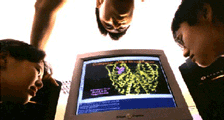



CZ5225 Modeling and Simulation in Biology (Elective, 4MC)
Synopsis
Prerequisite: CZ3252
Proteins: sequence => structure =>function. Protein structural
organizations and families. Basic modeling and simulation techniques.
Protein structural modeling: homology modeling, threading, ab initio
methods. Cell as a complex machine: Genetic and protein circuits (pathways).
Development
of a mathematical model of pathways. Computer simulation of pathways.
Instructor
Dr. Chen Yu Zong
Department of Computational Science
National University of Singapore
Office: Blk S17 Room 07-24
Tel: 6874-6877. Fax: 6774-6756
E-mail: yzchen@cz3.nus.edu.sg
Web: http://www.cz3.nus.edu.sg/~yzchen
(Lots of info about
biocomputing)
Lectures:
- Lecture 1: Introduction
- Lecture 2: Gene Expression Profiles and Microarray Data Analysis
- Lecture 3: Clustering Analysis for Microarray Data I
- Lecture 4: Clustering Analysis for Microarray Data II
- Lecture 5: Clustering Analysis for Microarray Data III
- Lecture 6: Microarray Cancer Classification
- Lecture 7: Microarray Class Classification by Machine learning Methods
- Lecture 8: Microarray disease predictor-gene selection by feature selection methods
- Lecture 9: Next Generation Sequencing
- Lecture 10: Copy Number Variations
- Project of CZ5225
- Case study using SOFT format
- Project of CZ5225 II
- groups.xls
Archived Lectures and Projects in 2007/2009:
- Lecture 1: Introduction
- Lecture 2: Gene Expression Profiles and Microarray Data Analysis
- Lecture 3: Clustering Analysis for Microarray Data I
- Lecture 4: Clustering Analysis for Microarray Data II
- Lecture 5: Clustering Analysis for Microarray Data III
- Lecture 6: Microarray Cancer Classification
- Lecture 7: Microarray Class Classification by Machine learning Methods
- Lecture 8: Microarray disease predictor-gene selection by feature selection methods
- Lecture 9: Biological Pathways I: Metabolic Pathways
- Lecture 10: Biological Pathways II: Signaling Pathways
- Lecture 11: Biological Pathways III: Pathway Simulation
Archived Lectures and Projects in 2005/2006:
- Lectures:
- Lecture
1: Introduction
(Right click to save) - Lecture
2: Proteins
(Right click to save) - Lecture
3: Sequence alignment methods
(Right click to save) - Lecture
4: Practical use of sequence alignment methods and introduction
of projects
(Right click to save) - Lecture
5: Drugs
(Right click to save) - Lecture
6: Drug resistance mutations and model developments
(Right click to save) - Lecture
7: Protein structure and structural modeling
(Right click to save) - Lecture
8: Protein structural prediction methods
(Right click to save) - Lecture
9: Pharmacogenetics and individual variation of drug response
(Right click to save) - Lecture
10: Prediction system for pharmacogenetic response to drugs
(Right click to save) - Lecture 11:
Other modeling and simulation methods in biology
- Lecture
1: Introduction
- Project Assignments:
- Grade:
Archived Lectures and Projects in 2004/2005:
- Lectures:
- Lect 1 Introduction
- Lect
2-3 Protein Families and Family Prediction Methods
(Right click to save) - Lect
4-5 Protein Structure and Structural Modeling
(Right click to save) - Lect
6-8 Protein structural prediction methods
(Right click to save) - Lect
9 Biological pathways and pathway simulation methods
(Right click to save)
- Project Assignments:
- Project 1:
- Option 1: Protein family classification by SVM
- Option 2: Develop a program of pair-wise sequence alignment using a simple scoring scheme.
- Project 2 : Design of structural modeling program
- Project 1:
References:
Protein families:
- A genomic perspective on protein families. Science 278, 631-637 (1997)
- Unification of protein families. Curr. Opin. Struct. Biol. 8, 372-379 (1998)
- Evolution of function in protein superfamilies, from a structural perspective. J. Mol. Biol. 307, 1113-1143.
- Transporters: TC-DB (Microbiol Mol Biol Rev. 64:354-411)
Protein family prediction methods:
- Multiple sequence alignments. JMB 235, 1501-153 (1994); JMB 301, 173-190.
- Neural network: ProtFun. J. Mol. Biol. 319:1257-1265, (2002)
- Support vector machines: SVMProt. Nucleic Acids Res., 31: 3692-3697 (2003)
Sequence alignment:
- Needleman-Wunsch method: JMB 48, 443-453 (1970)
- PAM: A model of evolutionary change in proteins. In: Atlas of protein sequence and structure (Natl. Biomed. Res. Found. Washington) Vol 5, Suppl 3. pp.345-358 (1978).
- Smith-Waterman method: JMB 147, 195-197 (1981)
- FASTA: Proc. Natl. Acad. Sci. USA 85, 2444 (1988)
- BLAST: JMB 215, 403-410 (1990).
- BLOSUM: Proc. Natl. Acad. Sci. USA 89, 10915-10919 (1992)
- HMM: JMB 235, 1501-153 (1994)
Support vector machines:
- C. Burges, "A tutorial on support vector machines for pattern recognition", Data Mining and Knowledge Discovery, Kluwer Academic Publishers,1998 (on-line).
- R. Duda, P. Hart, and D. Stork, Pattern Classification, John-Wiley, 2nd edition, 2001 (section 5.11, hard-copy).
- S. Gong et al. Dynamic Vision: From Images to Face Recognition, Imperial College Pres, 2001 (sections 3.6.2, 3.7.2, hard copy).
Protein structure
- SCOP database. J. Mol. Biol. 247, 536-540
Molecular modelling:
- AMBER: J. Am. Chem. Soc. 117, 5179-5197
- CHARMM: J. Comp. Chem. 4, 187-217
- Hydrogen bond model and parameters: Nucleic Acids Res. 20, 415-419. Biophys. J. 66, 820-826
- Biomolecular simulations: Recent developments in force fields, simulations of enzyme catalysis, protein-ligand, protein-protein, and protein nucleic acid noncovalent interactions. Annu. Rev. Biophys. Biomol. Struct. 30, 211-243 (2001).
Protein structure prediction methods:
- Protein folding theory: From lattice to all-atom models. Annu. Rev. Biomol. Struct. 30, 361-396 (2001).
- Knowledge-based protein modelling. Critical Rev. Biochem. Mol. Biol. 29, 1-68 (1994).
- Comparative protein structure modelling of genes and genomes. Annu. Rev. Biophys. Biomol. Struct. 29, 291-325 (2000).
- Ab initio protein structure prediction: Progress and prospects. Annu. Rev. Biophys. Biomol. Struct. 30, 173-189.
Biological pathway databases:
- KEGG: Kyoto Encyclopedia of Genes and Genomes.
- SPAD: Signaling Pathway Database.
- CSNDB: Cell Signaling Networks Database.
- PFBP: Protein Function and Biochemical Pathways.
Pathway simulation methods:
- Dynamic biochemical reaction process analysis and pathway modification predictions. Biotechnol. Bioeng. 68, 285-297 (2000)
- A mathematical model of caspase function in apoptosis. Nature Biotech. 18, 768-774 (2000)

 |
|
| about BIDD | databases | software | teaching | research | links | |